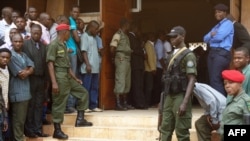Julius Ayuk Tabe and nine other separatist leaders made their first public appearance Thursday since Nigeria extradited the men to Cameroon in January.
The men appeared tired as they were brought into a Court of Appeals in the capital under heavy military escort.
Nigerian authorities arrested Tabe and 46 of his followers in Abuja, where they were accused of remotely leading a rebellion in English-speaking parts of Cameroon.
The 36 others who did not appear in court have yet to be seen in public.
Separatist supporter Diana Awemo said she traveled from the English-speaking northwestern town of Bamenda to see the men.
"We are happy. We can now confirm that ten of them are alive. We want to see the others that were kidnapped with them in Nigeria and brought back into Cameroon." Awemo said.
Defense counsel John Nsoh said the accused were deprived of their right to meet their lawyers. He said they have filed a motion for their immediate release.
"This is the first opportunity for them to tell their story to a court. These people were arrested illegally, they were abducted, they were not even arrested, taken from a foreign country and brought into Cameroon and detained incommunicado for more than 10 months," Nsoh said.
Cameroon’s government calls the separatist leaders terrorists and says those arrested will go before a military tribunal. If convicted, they could face the death penalty.
Tabe in October last year declared himself the president of what he called the English-speaking republic of Ambazonia in Cameroon’s northwest and southwest.
Since Tabe’s arrest, armed separatists have launched sporadic attacks in the region on the military, markets and public buildings. At least a hundred schools have been torched and 300,000 people have fled to safer, French-speaking towns and neighboring Nigeria.
The government says more than 400 civilians, police and troops have been killed in the fighting.
In spite of the tensions and violence, Emmanuel Ngaibe, a relative of one of the arrested separatist leaders, expressed hope they will receive a fair trial.
"I hope that the court will be very, very independent and exercise justice and that politicians will not intervene in the matter," Ngaibe said.
Violence erupted in Cameroon’s English-speaking regions in 2016 when teachers and lawyers protested alleged discrimination at the hands of the French-speaking majority.
The government responded with a crackdown that sparked a movement for an independent, English-speaking state.




